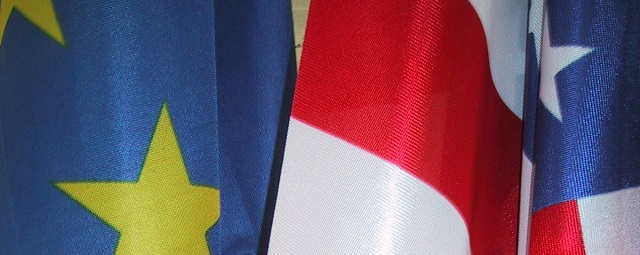Barack Obama’s support for a transatlantic free-trade agreement (TAFTA to us, TTIP to them) was widely welcomed as a boost to the EU. Yet, some pro-Europeans have since been quick to play it down. This may seem like an odd reaction, but the raw sense of relief that met the President’s February speech has worried them.
The TAFTA initiative was instinctively greeted as a means to anchor the US to Europe, to improve the EU’s resilience to globalisation and to trounce the Chinese – as a silver bullet, in other words, for an EU that is struggling to sustain itself. Fans of the EU are concerned that the bloc’s standing is being undermined.
They counter that the US doesn’t need anchoring in Europe. Its refocus towards Asia is designed to be in the EU’s interest as well its own, and its predicted energy self-sufficiency doesn’t amount to energy independence, meaning Washington will remain involved in the EU’s unstable neighbourhood if only to influence energy prices.
They also suggest that TAFTA is not just a distant prospect but a tough one. Tariffs are already low, meaning that progress will require the tricky harmonisation of regulatory regimes. And, although this will bring an aggregate economic boost (especially to the US, according to the latest projections), few individual employers will actually feel the difference, except perhaps in the form of increased competition.
As for the Chinese – why seek to trounce them? By some measures China is already the EU’s major trading partner, and its burgeoning middle class consumes just the kinds of unnecessary goods and services Europeans now specialise in. China’s stagnation not its economic rise is the real threat.
Well maybe. But if TAFTA remains so appealing, it’s because nobody has actually shown that the EU could flourish without it. Playing down the potential benefits of the agreement or the severity of the international situation is not the same as demonstrating that the EU has a realistic global strategy of its own.
Confidence in the EU’s capacity to hold its own internationally was not always this low. The long period of navel-gazing from the Constitutional Treaty to the euro crisis appears to have obscured an important fact: that the very point of the EU is its ability to handle international change.
The EU was established to balance out shifts in big power relations. Its internal policies – the single market, passport-free travel area, currency cooperation – allowed mistrustful West European states to cohere around common values and goals in the face of the Soviet threat. And, following the collapse of the USSR and the replacement of bipolarity by unipolarity, it was again the EU that provided the means for Europeans to accommodate newly-independent eastern states in the form of enlargement and neighbourhood policy.
Enlargement and neighbourhood policies were an important prong in the EU’s efforts to manage the ensuing wave of globalisation too, bringing close competitors under the bloc’s ambit. As part of this effort, the EU also became the first mover on issues from data protection to social-security coordination, inspiring international standards; it concertedly supported global institutions as a way to bind others; and, through redistributive policies such as development aid or the Social Funds, it weakened resistance to globalism amongst its discontents.
More recently, the EU has stretched to meet the challenge to global rules posed by emerging powers. Today’s hegemons tend to be of the regional variety. That means that they can ignore global norms and dominate the countries around them but lack the reach to solve bigger international problems like trade or the environment. In regionalism, the EU provides a possible answer, binding such countries into a local cooperative regime and using region-to-region cooperation to solve the bigger issues.
Of course, these approaches badly need adapting to take into account the EU’s recent weight-loss, the anachronistic overrepresentation of its members in global institutions, and the fact that the Union is a mere regional organisation in a globalised world. TAFTA and a strengthened transatlantic relationship could help the EU carry out that shift.
To achieve this, the EU would have to work hard to ensure that TAFTA negotiations involve the WTO at an early stage, are open and transparent to other states, and at the same time provide something of a gold standard for other regional trade regimes. In its current mood, however, this seems unlikely.
Today, the EU risks using any transatlantic trade agreement to cling to an outdated vision of unipolarity, to avoid integrating new powers into the international order, and to cement regionalism as a form of protectionism rather than international cooperation. In other words, the time for a strategic conversation is ripe.






Be the first to comment on "The free trade-accord opportunity for Europe"